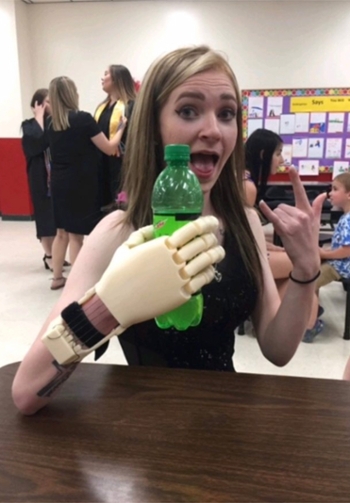Printing with a purpose
Inspired by class project, new student club aids those in need of prosthetics

The average traditional prosthetic can range from $5,000 to $50,000, and for many, taking on that financial burden isn’t an option.
A group of Purdue students wants to provide them for free.
Students taking COM 114 are required to propose a group project that could benefit the community. Mrigank Sharma inspired his group to propose creating prosthetics with 3D printers. His group members, Adrienne Rudolph, Connor Burton, Elizabeth Bir, and Riley King, supported the idea and went to work.
This project has expanded to become its own organization through COM Cares, and Sharma is now the president of this Purdue Prosthetics Club. They’ve already had the opportunity to create a prosthetic hand for a high school student in Arkansas named Brianna Ritter.
 “The first step was really identifying a client that needed a prosthetic and one that we were able to print for her using the resources that we had. Mrigank, the president, found a high school senior named Bri who was missing her hand and part of her wrist,” said Jessica Welch, a Ph.D. candidate in the Brian Lamb School of Communication who has advised the group for more than a year. “In spring semester 2019, the entire semester was devoted to creating this prosthetic for her, and we were able to mail it to her in May of 2019, which was our goal because she wanted it for high school graduation.”
“The first step was really identifying a client that needed a prosthetic and one that we were able to print for her using the resources that we had. Mrigank, the president, found a high school senior named Bri who was missing her hand and part of her wrist,” said Jessica Welch, a Ph.D. candidate in the Brian Lamb School of Communication who has advised the group for more than a year. “In spring semester 2019, the entire semester was devoted to creating this prosthetic for her, and we were able to mail it to her in May of 2019, which was our goal because she wanted it for high school graduation.”
The group continues to work with Bri to improve her prosthetic, and it has taken on three new clients, as well.
“Our first prototype … was a preliminary project. It was me and six other people working on it, and it was really a learning experience for us,” said Sharma, a sophomore in the College of Engineering. “That was spring semester last year. Between then and now, we have grown a lot. We have about 50 people working across three teams now.”
Every group in COM 114 has the opportunity to enter this final community project in the Fraser Speaking Competition, a competition on campus that supports public speaking projects and civic engagement. The competition consists of three rounds, and the winning team receives a cash prize, plus funding assistance to implement its proposal.
Sharma’s group finished as the runner-up in the fall 2018 competition. But because of the group’s impressive presentation in the speaking competition, a private donor offered to make a donation that would make the proposal happen. This gave the group funding to push the project forward.
This group of ambitious students has also been awarded a Service Learning Grant to fund their project. With this funding, they were able to purchase their own 3D printer. They are also hoping to receive an Engineering Merit Grant in the near future. This would allow them to continue making prosthetics with 3D printers for a much lower cost.
“Our entire organization is built upon allowing people with limb disabilities or missing limbs to have a normal life without the financial pressures that come with therapy and traditional prosthetics,” Sharma said. “It was a big thing for me in high school. I did a lot of research, and it was something that I was involved in. We realized that it was $10,000 or more that it would take just to go through the whole process of developing and fitting a traditional prosthetic.”
More and more people are getting involved with this opportunity to help others. Open to all Purdue students, the club provides participants an opportunity to collaborate with students from a range of backgrounds that they might not encounter otherwise.
“I do think it’s been a really cool experience in terms of the students getting to interact with other students who aren’t necessarily in the same majors as them,” Welch said. “It’s putting together a lot of people from different schools and departments, which is really cool.”
These students have been using the online community e-NABLE to reach out to potential clients who could benefit from a 3D-printed prosthetic. This is how they found Bri, and it’s also how they began to help their current clients.
They also have had discovered a client via word-of-mouth. One of Sharma’s professors heard about the club and reached out for assistance.
Craig Miller, a professor and Faculty Scholar in the Department of Computer Graphics Technology, told Sharma that his dog, Brutus, was struggling with hip problems. Miller asked if the group could come up with something that would help. These students were able to create a cart for Brutus that allowed him to move more easily.
As the club grows, it will continue in its mission to make prosthetics more accessible and affordable for those in need – benefiting both the recipients of the group’s handiwork and the club members who are able to help others.
“We’re building inexpensive prosthetics while using cheaper technology,” Sharma said. “We’re using our engineering knowledge to be able to come up with simpler solutions to the problems they’re facing right now.”